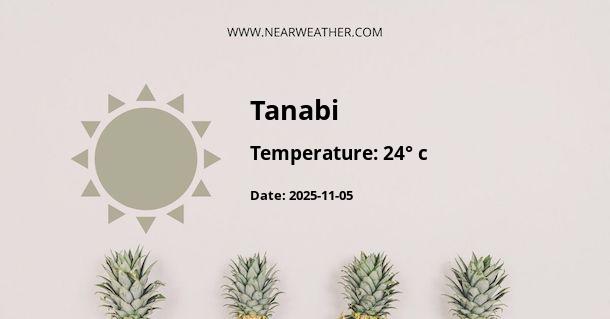Tanabi, Brazil: Climate and Weather Overview
Tanabi is a city located in the state of São Paulo, Brazil. It falls under the tropical savanna climate (Aw) classification according to the Köppen-Geiger climate classification system. The city experiences distinct wet and dry seasons, with consistently warm temperatures throughout the year. Understanding the climate and weather patterns in Tanabi is crucial for residents, visitors, and businesses operating in the region.
Annual Climate Summary for Tanabi
The following table provides a summary of the average weather conditions in Tanabi throughout the year:
| Month | Average High (°C) | Average Low (°C) | Average Precipitation (mm) |
|---|---|---|---|
| January | 31 | 21 | 261 |
| February | 31 | 21 | 191 |
| March | 30 | 20 | 138 |
| April | 29 | 19 | 68 |
| May | 28 | 18 | 22 |
| June | 27 | 17 | 7 |
| July | 28 | 17 | 8 |
| August | 29 | 18 | 19 |
| September | 29 | 19 | 47 |
| October | 30 | 20 | 114 |
| November | 30 | 21 | 161 |
| December | 31 | 21 | 213 |
From the table, it is evident that Tanabi experiences its highest precipitation levels during the months of January and December, which correlate with the wet season in the region. Temperatures remain consistently warm throughout the year, with average highs exceeding 28°C for the majority of the year.
Seasonal Variations in Tanabi
Tanabi experiences two distinct seasons: a wet season and a dry season. The wet season typically occurs from November to March, while the dry season spans from April to October. During the wet season, the region receives the majority of its annual precipitation, leading to lush greenery and vibrant landscapes. In contrast, the dry season is characterized by a decrease in rainfall and drier conditions.
Extreme Weather Events
While Tanabi generally experiences stable weather patterns, it is important to note that the region can occasionally be affected by extreme weather events such as tropical storms and thunderstorms. These events can result in heavy rainfall and strong winds, impacting local infrastructure and agriculture. It is essential for residents and businesses in Tanabi to be prepared for such occurrences and have measures in place to mitigate potential risks.
Impact of Climate on Agriculture and Economy
The climate in Tanabi plays a significant role in the region's agricultural sector. The combination of warm temperatures and seasonal rainfall provides favorable conditions for the cultivation of crops such as sugarcane, soybeans, and citrus fruits. The agricultural activities in Tanabi are closely tied to the region's economy, contributing to employment and local production.
Additionally, the warm and consistent weather in Tanabi makes it an attractive destination for tourism, particularly for individuals seeking a tropical climate and outdoor activities. The city's climate and natural surroundings create opportunities for eco-tourism and outdoor recreation, further supporting the local economy.
Conclusion
In conclusion, Tanabi, Brazil, experiences a tropical savanna climate characterized by distinct wet and dry seasons. The region's warm temperatures and seasonal precipitation patterns have significant implications for agriculture, economy, and tourism. Understanding the climate and weather variations in Tanabi is essential for individuals and businesses looking to thrive in this vibrant region.
A - Tanabi's Latitude is -20.626390 & Longitude is -49.649170.
A - Weather in Tanabi is 24° today.
A - Climate Conditions in Tanabi shows broken clouds today.
A - Humidity in Tanabi is 77% today.
A - Wind speed in Tanabi is 2.41 km/h, flowing at 327° wind direction. today.
